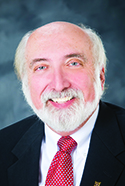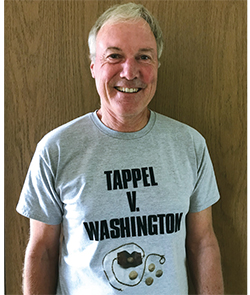July/August 2019
Title Bout: Free Speech vs. Public Protection
BY EVA KAPLAN-LEISERSON
 In six months, at $399 per month, any member of the public can become an engineer. A “self-driving car engineer,” that is. One online learning site offers the “nanodegree” in collaboration with several automotive and technology companies.
In six months, at $399 per month, any member of the public can become an engineer. A “self-driving car engineer,” that is. One online learning site offers the “nanodegree” in collaboration with several automotive and technology companies.
New technology, old problem. Use of the engineer title by unqualified professionals has long been a matter of concern for both individual practitioners and licensing boards.
In response to a 2015 Atlantic article, “Programmers: Stop Calling Yourselves Engineers,” then NSPE President Tim Austin, P.E., F.NSPE, wrote that “the ‘engineerwashing’ of software development is just the latest example of an industry pilfering the engineer title to create the appearance of credibility at the public’s expense.”
State licensing boards are usually responsible for regulating use of engineer titles. But in a number of cases, including some recent high-profile ones, the issue has reached the courts. Their responsibility: balancing the need to protect the public with free speech concerns.
The Case of the Red-Light Dispute
Mats Järlström and his red-light camera quest captured nationwide media attention. In brief, Järlström, who had earned an electrical engineering degree in Sweden but was not a licensed engineer, began to study and speak out about red-light timing after his wife received a ticket. In 2016, the Oregon licensing board fined him $500 for both publicizing his calculations, which they deemed the unlicensed practice of engineering, and calling himself an engineer, which the board said violated the state’s title law. Järlström took the case to court.
He challenged the title and practice laws, alleging that they violated First Amendment free speech protections, and requested that the court declare them unconstitutional overall.
In December 2018, a federal judge ruled that Järlström was within his First Amendment rights to use the term “engineer,” stating that he could study and communicate about his theories as long as his communications were outside of an employment or contractual setting. He could also refer to himself as an engineer.
The judge did not find support for the conclusion that someone who called herself an “engineer” would be assumed to be a professional engineer. Instead, she determined that, unlike M.D. or certified public accountant, there is no fixed meaning to the word “engineer” when it is used in many titles that don’t require professional engineering experience or licensure.
She wrote, “the regulation of the title ‘engineer’ is more burdensome than necessary to protect the public from the unlicensed practice of engineering.” The fix: strike the word “engineer” from the statutes and leave the remaining language to regulate use of the terms “professional engineer” and “registered engineer.”
In a statement, the Oregon State Board of Examiners for Engineering and Land Surveying noted that it would “no longer investigate or pursue an unregistered individual who identifies themselves as an ‘engineer.’”
The Tire Engineers Who Aren’t
How do you define “tire engineers”? In one context, the term means professional engineers with specialized knowledge and experience working with tires. In another, it denotes a company that sells and services tires.
This issue led to court cases not only in Mississippi, but also in a number of other states. But far from providing clarity, the far-flung discussions have generated differing conclusions.
Express Oil Change operates tire sale and service centers in various states as “Tire Engineers.” Informed in 2015 by the Mississippi licensing board that it was violating state law limiting the commercial use of “engineer” to licensed companies or individuals, the company filed a lawsuit asserting that the board was infringing on its First Amendment rights.
 DENNIS TRUAX
DENNIS TRUAXThe rationale of the Mississippi Board of Licensure for Professional Engineers and Surveyors, as its member Dennis Truax, P.E., F.NSPE, explains: The use of “engineer” carries with it a higher level of trust. “You expect the individuals associated with that enterprise to be professional, to have technical expertise that exceeds the norm, and you expect those individuals to be engaged in aspects of the practice of engineering.”
NSPE, which has long advocated that the use of the term “engineer” by unqualified and unlicensed entities is deceptive and endangers the public, provided research help for the case.
An initial ruling by the district court found compelling evidence of public confusion about the company’s use of actual engineers, based on a survey commissioned by the Mississippi licensing board. The judgment: the company was therefore not entitled to First Amendment protections.
However, in an appeal (for which NSPE signed onto a “friend of the court” brief), the case received a different interpretation. The appellate court reversed the decision, ruling that statements that are only potentially misleading (versus “actually or inherently misleading”) are protected by the First Amendment.
“The term ‘engineer’ can mean many things in different contexts,” the opinion stated, “and it is certainly not limited to those professionals licensed by Mississippi to practice engineering.”
As Harold Pizzetta III, the Mississippi assistant attorney general who argued the case, explains, the doctrine protecting the title still exists. However, courts have “ratcheted up the level of evidence that would be needed to effectively prohibit the use of the term.”
According to Truax, the board was disappointed in the ruling because its members still felt that, based on the survey, potential existed for public harm. In addition, confusion could lead to a demeaning of the profession of engineering, he says, if its terms are used in “what we would deem less than an appropriate fashion.”
Same Name, Different Results
The appellate court’s opinion noted that other states with similar statutes have not challenged the use of the name, and Mississippi is an “outlier.” Those include Alabama, Georgia, Florida, North Carolina, South Carolina, Tennessee, and Virginia.
In North Carolina, the licensing board actually reversed its initial position. As Andrew Ritter, executive director of the North Carolina Board of Examiners for Engineers and Surveyors, explains, at first the board thought the public would be misled by the Tire Engineers name.
However, after the company presented photos of tire stacks and garage bays, the board decided that customers wouldn’t be confused about getting professional engineer services after all.
In the Mississippi case, the court’s judgment stated that the board failed to address why a less restrictive solution, such as a disclaimer, would not fulfill the goal of protecting the public. This is the route taken by Texas, requiring a notice at each location that the company doesn’t offer or provide engineering services.
“It’s something the [Mississippi] board is still considering,” says Pizzetta.
Protecting the Public, Not the Profession
As North Carolina’s Ritter explains, questions about who gets to use the word “engineer” can be sensitive. “It’s a great word. It’s a word that’s respected; it’s got a reputation that comes with it,” he continues. “A lot of entities want to use that word.”
In a 1976 case that pitted the North Carolina licensing board against an IBM “customer engineer,” the Court of Appeals of North Carolina found, as Ritter explains, “If the public can’t be misled by the use of the title, then we cannot claim ownership over it.”
“The term ‘engineer’ is a generic term with many uses and variations which do not represent a danger to the public and which the board is not authorized to preempt,” the opinion stated. Examples in the opinion included “sanitation engineers” and “custodial engineers.”
Further, the opinion said, if the word is not modified by words such as “professional,” “registered,” or “licensed,” it cannot represent that an engineer is a licensed or professional engineer. The board is only granted the authority to restrict uses of the title that imply professional engineering status or expertise, the court found.
Since then, the North Carolina board has tried to use good judgment in enforcing the law, Ritter says. The key is to keep in mind the public’s perspective. “Our job is not to protect the professional engineering industry,” he says. “Our job is to protect the public.”
He continues, “If they’re thinking they’re getting an engineering service from someone who was educated and passed the PE exam, then that person needs to be licensed. If there’s no confusion, we’re not going to step in.”
The North Carolina board has shifted its focus from discipline to helping engineers and businesses comply with the law. A staff member is assigned solely to working with firms for this purpose.
In a recent example, the board found issue with a company that makes custom vans for the news industry, which was moving into the state. It was a big win for North Carolina, but the website posed a problem, with “engineer,” “engineering,” “design,” all over it. For its pushback, the licensing board received some heat both from the company and others in the state.
But, Ritter says, the board wasn’t saying no. It was saying, “We want you to do this the right way, and here are the steps to doing so.” After working with the company to fix the wording, “about a week ago, we got an invitation to the ribbon cutting.”
Since the IBM case, Ritter explains, “knock on wood,” no one has taken the North Carolina board to court. He believes, “most of the time it’s because we are willing to work with you to get in compliance.”
Exceptions and Exemptions
As Ritter notes, the North Carolina licensing board and others don’t get involved in cases of exemptions, whether industrial or governmental. “We’re not going to get involved when state and local municipalities are calling employees engineers,” he says. “We’ve been told that’s not our business.”
Also, internal designations in companies, such as in the IBM case, would no longer prompt North Carolina involvement. “Only in cases when they’re using the title and offering services to the public is when we’re going to get interested,” says Ritter.
But in Washington State, two professional engineers have raised concerns about use of the engineer title among unlicensed professionals in state and local government and some private firms.
 PAUL TAPPEL SPORTS A T-SHIRT, DESIGNED BY FAMILY MEMBERS, DRAWING A PARALLEL BETWEEN HIS CASE AND THE BIBLICAL STORY OF DAVID VERSUS GOLIATH. THE PE, WHOSE MIDDLE NAME IS DAVID, ALSO CARRIED FIVE SMALL STONES TO COURT.
PAUL TAPPEL SPORTS A T-SHIRT, DESIGNED BY FAMILY MEMBERS, DRAWING A PARALLEL BETWEEN HIS CASE AND THE BIBLICAL STORY OF DAVID VERSUS GOLIATH. THE PE, WHOSE MIDDLE NAME IS DAVID, ALSO CARRIED FIVE SMALL STONES TO COURT.The Washington State Board of Registration for Professional Engineers and Land Surveyors has stated that it “will not pursue investigations against the use of titles unless the titles used are ‘professional engineer,’ ‘structural engineer,’ or ‘professional land surveyor.’”
However, Paul Tappel, P.E., believes this is an incorrect interpretation of the state statute, which indicates that “engineer means a professional engineer as defined in this section.” That definition includes “legal registration as a professional engineer.”
As Tappel sees it, the statute may need to be revised to clarify who can work as an engineer within the public domain. “There’s one clause in the exceptions which specifically authorizes people to do engineering work if supervised by licensed engineers,” the NSPE member says. “That’s been conflated by some government agencies and private consulting firms to say that not only can those people do engineering work, they can also have a professional title of engineer, like civil engineer.”
In Tappel’s opinion, the current situation is “harmful to the general public, an illegal variation from the Engineer Registration Act, dismissing of the entire PE community state-wide, and possibly a terrible precedent for engineer registration acts for all states nationwide.”
The PE has been pursuing legal action against the State of Washington, including the Board of Registration for Professional Engineers and Land Surveyors. In May, the judge ruled in favor of the state and licensing board. Tappel is pursuing an appeal, which he sees as in the public interest.
Like Tappel, Sharon Zimmerman, P.E., has made this issue a passion project. According to the former city engineer, she became aware that agency employees used job titles that she says implied a civil engineering license—such as bridge engineer, traffic engineer, transportation engineer, or state design-build engineer.
In addition, the NSPE member wrote on the Society’s online Open Forum, “detailed research has also found examples of unlicensed ‘engineers’ not being directly supervised by a licensed engineer.” She continued, “This needs to stop. It is unnecessarily compromising public safety.”
Zimmerman asserts that someone who sees the engineer title is expecting a minimum level of qualifications and the understanding of professional ethics and legal liabilities that comes with licensure.
Tappel and Zimmerman are currently in discussions with the Washington Society of Professional Engineers, which last year established a committee to monitor Tappel’s case and, as the WSPE’s 2018–19 president, Steven Collins, P.E., explains, the larger issues involved. Having received the committee’s report, the WSPE board is considering its next steps.
Focus on Public Safety
The National Council of Examiners for Engineering and Surveying, comprised of engineering and surveying licensure boards from US states and territories, leaves licensing issues to its members. As CEO David Cox puts it, “it falls to the purview of each of the state boards” and their statutes.
However, NCEES does advise its member boards that (1) They need to be familiar with their own laws and be sure they don’t exceed their statutory authority, and (2) That courts are increasingly focused on issues of public safety.
It’s no longer enough to say that something violates the statute, says Cox. Courts are asking for the public safety implications.
That’s part of the current antilicensure, antiregulation environment, he adds. But also, in some cases, it may be judges trying to use a more common-sense approach.
In most states the protected term is “professional engineer,” not “engineer,” he says. But if someone is using either term to try to give the public the perception that they’re licensed when they’re not, then a board would be authorized to pursue action.
Cox describes a Venn diagram in which statutes intersect with threat to the public. He advises boards to focus their resources on that overlapping area. It falls on the boards to use their judgment, he says. “That’s why boards exist, for their judgment.”
Find a discussion of the Washington State issue in the Open Forum of NSPE’s Communities. Tappel invites those interested in learning more to contact him.
NSPE’s Position on Engineering Titles
According to NSPE’s Position Statement 10-58, engineering titles “should only be conferred upon those individuals who have earned them by virtue of: 1) Licensure under a jurisdiction engineering licensure law; or 2) Graduation from an ABET/EAC program or an equivalent program; or 3) An official ruling under the Fair Labor Standards Act, as amended, which defines engineers as learned professionals.”
As the rationale explains, “The indiscriminate utilization of engineering titles by individuals who are not clearly professionally qualified as set forth in this policy serves only to confuse the public.”
Resources on State Licensure Laws
NSPE offers resources on the laws and regulations affecting the professional engineer. These include “Defining the Practice of Engineering” and “Exemptions to Engineering Licensure Laws.”


 Volunteering at NSPE is a great opportunity to grow your professional network and connect with other leaders in the field.
Volunteering at NSPE is a great opportunity to grow your professional network and connect with other leaders in the field. The National Society of Professional Engineers (NSPE) encourages you to explore the resources to cast your vote on election day:
The National Society of Professional Engineers (NSPE) encourages you to explore the resources to cast your vote on election day: